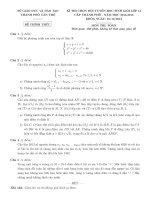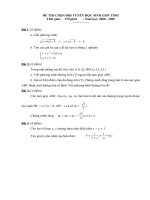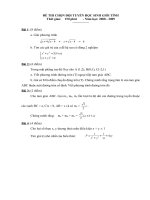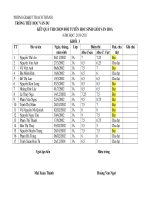KỲ THI CHỌN ĐỘI TUYỂN HOC SINH GIỎI DỰ THI QUỐC GIA LỚP 12 THPT Môn: ANH VĂN ppt
Bạn đang xem bản rút gọn của tài liệu. Xem và tải ngay bản đầy đủ của tài liệu tại đây (197.96 KB, 9 trang )
Sở GD và Đào Tạo Nghệ An
KỲ THI CHỌN ĐỘI TUYỂN HOC SINH GIỎI DỰ THI QUỐC GIA LỚP 12 THPT
Môn: ANH VĂN
Thời gian làm bài: 180 phút ( không kể thời gian giao đề )
PART I: LISTENING COMPREHENSION
Question 1: Listen to the two counseling interviews. Write what each student wants to be.
(an example has been done for you)
Question 2: Listen and check (√) the words used to describe each person.
Alan Tracy
sensitive serious angry ambitious
generous. intelligent friendly humorous
Jenny Greg
caring calm energetic original
wise angry creative talented
PART II: VOCABULARY AND GRAMMAR
Question 3: Pick out ONE best option (A, B, C or D) to complete each sentence.
1. The coast was……………distinguishable in the mist.
A. none B. no
C. neither D. barely
2. ………….a few sounds produced by insects can be heard by humans.
A. Only B. There are only
B. That only D. with only
3. My son dropped………….college and joined the army.
A. away from B. by
B. C. off D. out of
4. Winning a lottery is a rare occurrence. ………….very small.
A. A number of winners is B. The number of winners is
C. A number of winners are D. The number of winners are
5. Is he really………… to judge a brass band contest?
A. competent B. skillful
C. capable D. efficient
6. We would contact your nearest relative……………any accident occurring.
A. on account of B. in spite of
C. in the event of D. in place of
6. His doctor suggested that he…………….a short leave of absence.
A. will take B. would take
C. take D. took
7. The two boys have very………….characters.
A. similar B. alike
C. likely D. same
8. Down……….for three days.
A. the rain poured B. poured the rain
C. did the rain pour D. do the rain poor
2
Question 4: Complete these sentences, using the suitable forms of the words in
brackets.
1. I have no excuses. My actions were…………. (explain)
2. The house had been left………….for several years. (occupy)
3. The child showed a healthy……………. (curious)
4. Scott was sentenced to five years’…………for his part in the armed robbery. (prison)
5. ……………books have been written on the subject. (number)
6…………… or not, his father should pay some of the costs of repairing the damage. (blame)
7. Solving this alone could be very…………. (problem)
8. He has recorded the……… for the production. (narrative)
Question 5: There are 8 errors in the passage below. Read the passage, find out these
errors then correct them. The number (()) is an example.
Health food addicts have at last gained the support of the National Academy of Sciences in the
argument (0.for -> about) the relationship from diet and cancer. The National Academy has issued a
500 – pages report called “Diet, Nutrition and Cancer” that recommend dietary strategies for protect
yourself from cancer. For example, they advise you reducing your consumption of fat, as in pork and
butter, and increase your intake vitamin C, as grapefruit and cabbage. More beta – carotene, a type of
vitamin A in yellow and green vegetables, should be added your diet as well.
Question 6: Choose ONE option (A, B, C or D) corresponding to the best sentence which is
made up from the given cue words.
1. / important / it / stop / brother / your / drink / once/ wine /.
A. It’s important that your brother should stop drinking wine at once.
B. It’s important that your brother stopped drinking wine at once.
C. It’s important that your brother drinks smoking at once.
D. It’s important that your brother may stop smoking at once.
2. / use / be / singer/ singing/ national / Thanh Tam / the best / of / club /.
A. Thanh Tam used being the best singer of the national singing club.
B. Thanh Tam used to be the best singer of the national singing club.
C. Thanh Tam used to being the best singer of the national singing club.
D. Thanh Tam uses to be the best singer of the national singing club.
3. / hurt / she /without/ boyfriend / anything / learn / leave / say /.
A. She was hurt when learning that had her boyfriend left her without saying anything.
B. She was hurt that when learning that had her boyfriend left her without saying anything.
C. She hurt was when learning that had her boyfriend left her without saying anything.
D. She was hurt when learning that her boyfriend had left her without saying anything.
4. / motorway / now that / take / get / build / hours / there /.
A. Now that the motorway has been built, it took only two hours to get there.
B. Now that the motorway has been built, it is taking only two hours to get there.
C. Now that the motorway has been built, it takes only two hours to get there.
D. Now that the motorway has been built, it has taken only two hours to get there.
5. / kind / it / into / help / him / them / trouble / get / they/ .
A. It was kind with him to help them when got into trouble.
B. It was kind to him to help them when got into trouble.
C. It was kind of him to help them when got into trouble.
D. It was kind for him to help them when got into trouble.
6. / girl / joyfully / jump / hear / result / as soon as / she /.
3
A. The girl jumped joyfully as soon as she heard the result.
B. The girl jumped as soon as she heard the result joyfully.
C. She heard the result as soon as the girl jumped joyfully.
D. The girl heard the result joyfully as soon as the girl jumped.
7. / grateful / I / you / kindness / visit / last week / me / hospital / you /.
A. I’m grateful with your kindness to you when you visited me at hospital last week.
B. I’m grateful to you for your kindness when you visited me at hospital last week.
C. I’m grateful to you of your kindness when you visited me at hospital last week.
D. I’m grateful to you at your kindness when you visited me at hospital last week.
8. / exhausted / by / throw / his work / himself / on his bed /.
A. Was exhausted by his work, he threw himself on his bed.
B. Exhausted himself by his work, he threw on his bed.
C. Threw himself on his bed, exhausted by his work.
D. Exhausted by his work, he threw himself on his bed.
PART III: READING
Question 7: Read the passage below then pick out ONE best option ( A, B, C or D ) in each
question.
Eugene O’Neill, considered America’s greatest playwright, was born in October 1888. The son
of James O’Neill, a famous actor of the time, O’Neill attended Princeton University briefly before
leaving school and taking on a variety of jobs. In 1910 he became a seaman, sailing to places such as
South Africa and South America, where he observed the plight of the less fortunate. In 1912 he
contracted tuberculosis and entered a sanatorium. It was during this period of recuperation that O’Neill
decided to become a playwright.
O’Neill was the first American dramatist to devote his talent to writing tragedy. Prior to O’Neill,
most successful plays were sentimental comedies or melodramas. O’Neill based many of his plays on
his experiences at sea, which had led him towards a pessimistic view of humanity. Most of O’Neill’s
characters are seeking meaning in their lives, having been robbed of faith by the cold statements of
science. In “The Iceman Cometh” (1939), his most cynical play, the characters in a saloon have ruined
their lives and try to find meaning in their illusions which, when taken away, leave them in complete
despair.
Several of O’Neill‘s stage plays won Pulitzer Prizes – Beyond the Horizon (1920); Anna Christie
(1922); Strange Interlude (1928); and Long Day‘s Journey Into Night (1957), awarded after his death.
O’Neill won the Nobel Prize for literature in 1936. Most of his plays had been written before he started
suffering from Parkinson’s disease, which hampered efforts to write. O’Neill died in November 1953.
1. What is the best title for this passage?
A. America’s Greatest Playwrights.
B. The Life and Works of Eugene O’Neill.
C. Dramatic Stage Plays.
D. A Famous Actor.
2. It can be inferred from the passage that O’Neill…………
A. became an actor as well as playwright.
B. was a seaman for more than a decade.
C. did not care much for academic studies.
D. did not see his father very often.
3. According to the passage, when did O’Neill decide to become a playwright?
A. While attending Princeton University.
B. During his sailing days.
C. After he got married.
D. While recovering from an illness.
4. According to the passage, O’Neill was the first American playwright……………….
4
A. to concentrate on producing tragedies.
B. to write sentimental comedies.
C. to base his plays on personal experiences.
D. to fully exploit the use of melodrama.
5. In line 12 + 13, the author uses the phrase “leave them in complete despair” to indicate that…………
A. O’Neill’s family could not understand him.
B. O’Neill characters had no hope left.
C. illusion is the only source of happiness.
D. O’Neill left his family several times.
Question 8: Fill in each numbered blank with ONE suitable word to complete the passage
below:
Every nation has a set of rules, either written or unwritten, which determines (1)……… how
people act with each other. Formal, written rules are often laws, and they control how we drive, operate
a business, or run a government. Individuals who (2)……….laws may be fined and put in jail. Because
illegal behavior generally harms other individuals or society at large, our court system must punish
people who disregard these (3)…………rules.
Informal rules, often called “manners” or “etiquette” describe correct and (4)………. action in
such situations as eating in a restaurant, going on a date, or working in an office. If one is impolite or
misbehaves in these situations, other people often consider the offender immature or insensitive. And
although we can strongly disapproval of such misconduct, we cannot (5)……… punish someone for
simply being inconsiderate or unpleasant.
Neither laws (6)………….manners are inflexible; both change as society develops. For example,
in the early twentieth century, the selling of alcohol was prohibited by the 18
th
Amendment to the
Constitution. This law, (7)… ….had to be changed because the government found it (8)………
to force people to drink only nonalcoholic beverages. More recently, many people were dissatisfied with
the imbalance between the rights of men and women worked hard to pass the Equal Rights Amendment.
As women became more independent and took on new roles, a new law was considered necessary to
reflect that change.
Both laws and manners are important to society. (9)…………seek to prevent injustice and protect
the rights of citizens. A nation without laws would be unstable; all citizens would need to actively
distrust everyone. While laws protect us from one another, the “unofficial” rules of etiquette help us to
show friendliness and kindness toward each other. (10)…………laws and manners help a society run
smoothly.
Question 9: The article below is not complete and logical. Eight paragraphs have been
removed from it. Find out one of the suitable paragraphs (A- H ), then insert it into the gaps (1- 6)
where it should be to make the article a good one.
Every woman desires to be beautiful; if she is not born so, she tries to make herself look beautiful by
plucking her eyebrows and painting her lips and powdering her face. However, beauty does not just stop
at the face.
Her mother realized this could spoil her beauty, so she bound Tan Ki’s feet with cloth, narrowing them
to a point. She then made Tan Ki wear small feet and shoes caused quite a sensation, and she was
chosen to enter the Emperor’s court.
First, they doubled up the girl’s four small toes and folded them under the sole, leaving the big toe
intact. This gave the foot an overall pointed appearance. To make the foot even smaller, the arch of the
foot was pushed inwards, bringing the heel as near as possible to the large toe.
1
2
5
The bandages were changed once a week when the feet were bathed in warm water and dusted with
powder. Then the feet were bandaged again but this time a little tighter. After eight years of constant
restriction the feet would be daintily pointed and soles flat; however, a deep groove would remain
underneath the girl’s soles.
Another of the Home’s “grand old ladies” who had her feet bound is Mrs. Rose Tong. Born in Hunan,
where her father dealt in the sale of shoes, she said that in those days it was unusual to see a woman
without bound feet.
Eighty – four – year – old Mrs. Au Yong Yuet Ping recalled that every girl had her own wardrobe of
tiny shoes which she sewed herse.
THE REMOVED PARAGRAPHS:
A. Today women no longer bind their feet, but there are still many women which bound feet. Mrs. Ho
Beng, who lives at an Old Folks’ Home recalled: “I came from a wealthy family in China. When I was
seven years old, my feet were bound, but I do not remember their feeling painful; at mostly they felt
itchy”.
B. Many women followed Tan Ki’s mother example and bound their daughters’ feet, and soon it
became the fashion of those days. The foot – binding ceremony was usually performed when the girl
was about five to seven years old because at this age her flesh was soft and her bones supple. Since
whole housefuls of women had bound feet, they willingly helped the mother of the child in the binding
ceremony.
C. In traditional China a woman‘s beauty lay in small feet, and the practice of foot – binding became
commonly accepted towards the end of the Shang dynasty. Historians have said that one of the loveliest
women of that time, Tan Ki, had unusually large feet.
D. Then the woman wrapped damp bandages round the foot, binding them tightly round the heel and
under the sole of the foot. When the wet strips of cloth dried, the material shrank and tightened the grip
on the foot.
E. I glanced over my shoulder towards the source of the noise, and my eyes immediately fixed on a
huge grey serpent – like thing that was slithering through one of the high windows.
F. “Everyone had small feet – my mother, grand-mothers, aunts and cousins; they walked in a very
peculiar manner because of it. My mother bound my feet when I was very young. At first the pain was
unbearable, but gradually it lessened and I soon forgot about it.
G. They were usually of different colors and materials, suitable for home – wear and for important
occasions. Some girls even slept with their shoes on, but these were made of soft, plain – colored fabric
of a cheaper quality.
H. More recent studies include the case of a girl who associated colors with the notes of bird song.
There was also a boy who felt pressure sensations in his teeth when cold compresses were applied in his
arms.
PART IV: WRITING
3
4
5
6
6
Question 10: For each of the sentences below, write a new sentence as similarly as possible in
meaning to the original one, but using the word given. This word must not be altered in any
way:
Example: (0) It’s unlikely that I’ll see you again this week. (probably)
We probably won’t see each other again.
1. You can eat candy but you must always clean your teeth afterwards. Provided
Provided (that)…………………………………………………………………………
2.If I could work as a teacher of English, that's what I would like to do. opportunity
If I……………………………………………………………………………………
3. He's very good at tennis and he's also a very good footballer. addition
He’s…………………………………………………………………………………
4. Unfortunately. I haven't got enough money to buy a new laptop this month. afford
I wish
5. Is leaving everything here really necessary? left
Does everything
6. We don’t seem to have any money left. running
We…………………………………………………………………………………….
7. Why does everything seem to be difficult to me? only
If………………………………………………………………………………………!
8. The rain was coming down in torrents. cats
It was……………………………………………………………………………………
Question 11: Study the graphs below. Write a short description on the percentage of using
Internet in the continents in the world in 2007. Give your comments. (in about 120 – 150 words)
The percentage of people using Internet
in the continents in the world in 2007
(Percent)
7
43.97%
41.37%
41.38%
17.26%
5.39%
0%
20%
40%
60%
Africa
Asia
Europe
America
Australia
Africa
Asia
Europe
America
Australia
HƯỚNG DẪN CHẤM MÔN ANH VĂN
KỲ THI CHỌN ĐỘI TUYỂN HOC SINH GIỎI DỰ THI QUỐC GIA LỚP 12 THPT
PART I: LISTENING COMPREHENSION
Question 1: (1p for 1 correct answer x 5 = 5 points)
8
|Students Wants to be Strengths Weaknesses
Jenny Tan
architect
Math
Science
Julie Morris
Sports medicine
specialist
Physical education
Sports
Science
Business
English
Music
Question 2: Listen and check (√) the words used to describe each person.
(1,25p for 1 correct answer x 8 = 10 points)
Alan: sensitive √ intelligent √ Tracy: angry √ humorous √
Jenny: caring √ calm √ Greg: creative √ talented √
PART II: VOCABULARY AND GRAMMAR
Question 3: Pick out ONE best option (A, B, C or D) to complete each sentence
(1,25p for 1 correct answer x 8 = 10 points)
1. D 3. D 5. A 7. A
2. A 4. B 6. C 8. B
Question 4: Complete these sentences, using the suitable forms of the words in
brackets. (1,25p for 1 correct answer x 8 = 10 points)
1. explainable 3. curiosity 5. Innumerable 7. problematic
2. unoccupied 4. imprisonment 6. Blameworthy 8. narration
Question 5: There are 8 errors in the passage below. Read the passage, find out these
errors then correct them.
(1,25p for 1correct answer x 8 = 10 points)
Mistake Correction Mistake Correction
1 from between 5 reducing to reduce
2 a 50 - pages A 50 - page 6 intake vitamin intake of vitamin
3 recommend recommends 7 as grapefruit as in grapefruit
4 protect protecting 8 added your diet
added to your diet
9
Question 6: Choose ONE option (A, B, C or D) corresponding to the best sentence which is made
up from the given cue words.
(1,25p for 1correct answer x 8 = 10 points)
1. A 3. D 5. C 7. B
2. B 4. C 6. A 8. D
PART III: READING
Question 7: Read the passage below then pick out ONE best option ( A, B, C or D ) in each
question.(2p for 1 correct answer x 5 = 10 points)
1. B 2. C 3. D 4. A 5. B
Question 8: Fill in each numbered blank with ONE suitable word to complete the passage below:
(1p for 1correct answer x 10 = 10 points)
1. how 3.formal 5.legally 7.however 9.Laws
2. disobey 4.incorrect 6. nor 8.impossible 10.Both
Question 9: The article below is not complete and logical. Eight paragraphs have been removed
from it. Find out one of the suitable paragraphs (A- H ), then insert it into the gaps (1- 6 ) where it
should be to make the article a good one. There is one extra paragraph which you do not need to
use: (2,5p for 1correct answer x 6 = 15 points)
1. C 2. B 3. D 4. A 5. F 6. G
PART IV: WRITING
Question 10: For each of the sentences below, write a new sentence as similarly as possible in
meaning to the original one, but using the word given. This word must not be altered in any way:
(1p for 1correct answer x 10 = 10 points)
1. Provided (that) you clean your teeth afterwards, you can eat candy.
2. If I had the/ an opportunity to do so, I would like to work as a teacher of English.
3. He’s a very good footballer/ tennis player in addition to being a very good tennis player / footballer.
OR: He’s a very good footballer/ tennis player in addition (is) a good tennis player/ footballer.
4. I wish I could afford to buy a new laptop this month.
5. Does everything really have to be left?
6. We are running out of money.
7. If only everything weren’t difficult to me!
8. It was raining cats and dogs.
Question 11: Study the graphs below. Write a short description on the percentage of using
Internet in the continents in the world in 2007. Give your comments. (in about 120 – 150 words)
(20 points)
Grammar & Vocabulary 30%
Style 40%
Content 30
TOTAL: 120 / 6 = 20









